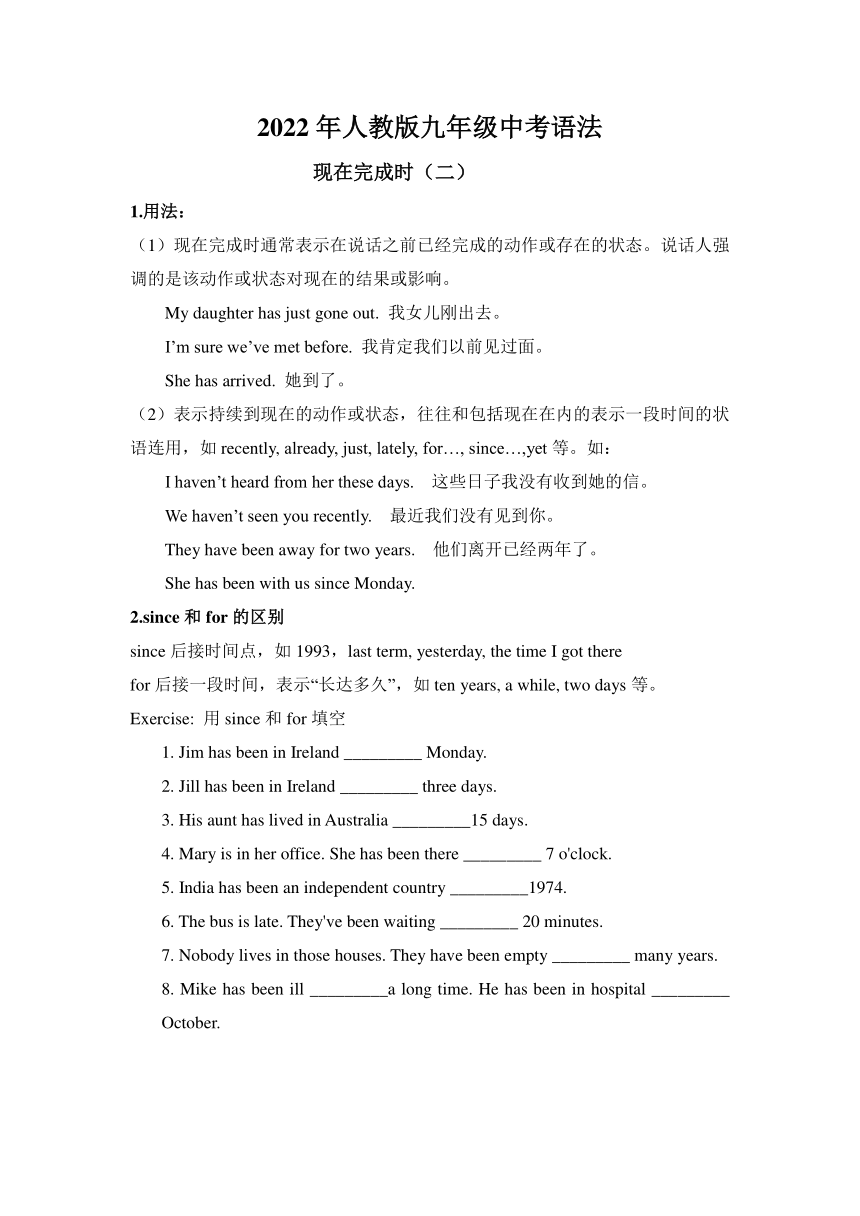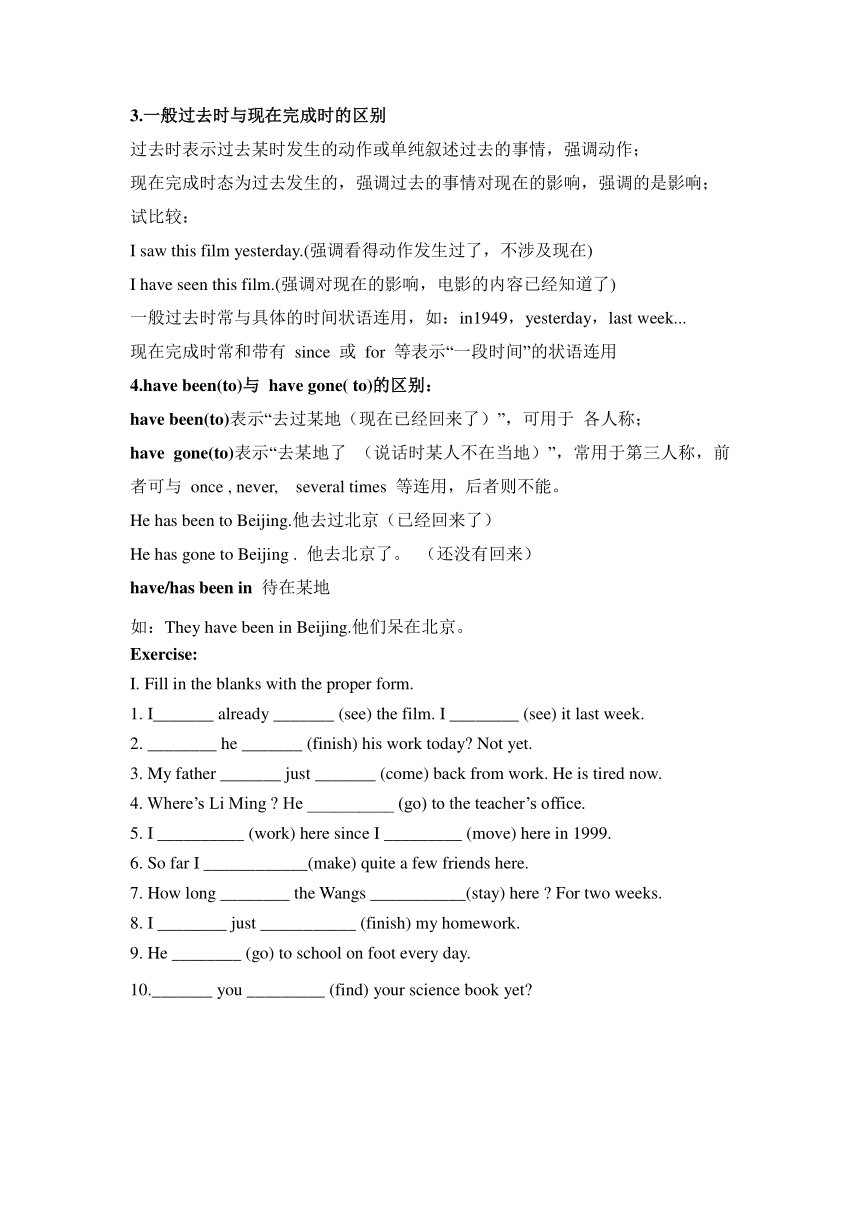2022年人教版九年级中考语法 现在完成时(二)含答案)
文档属性
| 名称 | 2022年人教版九年级中考语法 现在完成时(二)含答案) |  | |
| 格式 | docx | ||
| 文件大小 | 18.5KB | ||
| 资源类型 | 教案 | ||
| 版本资源 | 通用版 | ||
| 科目 | 英语 | ||
| 更新时间 | 2022-04-15 15:58:03 | ||
图片预览


文档简介
2022年人教版九年级中考语法
现在完成时(二)
1.用法:
(1)现在完成时通常表示在说话之前已经完成的动作或存在的状态。说话人强调的是该动作或状态对现在的结果或影响。
My daughter has just gone out. 我女儿刚出去。
I’m sure we’ve met before. 我肯定我们以前见过面。
She has arrived. 她到了。
(2)表示持续到现在的动作或状态,往往和包括现在在内的表示一段时间的状语连用,如recently, already, just, lately, for…, since…,yet等。如:
I haven’t heard from her these days. 这些日子我没有收到她的信。
We haven’t seen you recently. 最近我们没有见到你。
They have been away for two years. 他们离开已经两年了。
She has been with us since Monday.
2.since和for的区别
since后接时间点,如1993,last term, yesterday, the time I got there
for后接一段时间,表示“长达多久”,如ten years, a while, two days等。
Exercise: 用since和for填空
1. Jim has been in Ireland _________ Monday.
2. Jill has been in Ireland _________ three days.
3. His aunt has lived in Australia _________15 days.
4. Mary is in her office. She has been there _________ 7 o'clock.
5. India has been an independent country _________1974.
6. The bus is late. They've been waiting _________ 20 minutes.
7. Nobody lives in those houses. They have been empty _________ many years.
8. Mike has been ill _________a long time. He has been in hospital _________ October.
3.一般过去时与现在完成时的区别
过去时表示过去某时发生的动作或单纯叙述过去的事情,强调动作;
现在完成时态为过去发生的,强调过去的事情对现在的影响,强调的是影响;
试比较:
I saw this film yesterday.(强调看得动作发生过了,不涉及现在)
I have seen this film.(强调对现在的影响,电影的内容已经知道了)
一般过去时常与具体的时间状语连用,如:in1949,yesterday,last week...
现在完成时常和带有 since 或 for 等表示“一段时间”的状语连用
4.have been(to)与 have gone( to)的区别:
have been(to)表示“去过某地(现在已经回来了)”,可用于 各人称;
have gone(to)表示“去某地了 (说话时某人不在当地)”,常用于第三人称,前者可与 once , never, several times 等连用,后者则不能。
He has been to Beijing.他去过北京(已经回来了)
He has gone to Beijing . 他去北京了。 (还没有回来)
have/has been in 待在某地
如:They have been in Beijing.他们呆在北京。
Exercise:
I. Fill in the blanks with the proper form.
1. I_______ already _______ (see) the film. I ________ (see) it last week.
2. ________ he _______ (finish) his work today Not yet.
3. My father _______ just _______ (come) back from work. He is tired now.
4. Where’s Li Ming He __________ (go) to the teacher’s office.
5. I __________ (work) here since I _________ (move) here in 1999.
6. So far I ____________(make) quite a few friends here.
7. How long ________ the Wangs ___________(stay) here For two weeks.
8. I ________ just ___________ (finish) my homework.
9. He ________ (go) to school on foot every day.
10._______ you _________ (find) your science book yet
Grammar现在完成时(三)
考点:表示短暂意义的动词如arrive, leave, borrow, buy, begin, start, die等,在完成时当中不能和表示一段时间的状语连用,因为它们表示的动作不可能持续。
结束性动词转换为以下延续性动词或者表示可以延续的状态的短语。
① arrive at / in sp. / get to / reach sp. / come / go / move to sp.
→ be in sp / at school / at home / on the farm / be here / be there
He got to Beijing five minutes ago.
He____________________Beijing for____________________.
I moved to the USA in 2008.
I____________________the USA since____________________.
I went home yesterday.
I____________________home for____________________ .
They came here last week.
They ____________________ here since____________________.
② come to / go back to / return to→ be back to go out → be out
1) He came out two years ago.
He ____________________for____________________.
2)We return to Beijing yesterday.
We ____________________ to Beijing since ____________________.
③ become → be
1) I became a teacher in 2000.
I ____________________ a teacher for____________________.
2)The river became dirty last year.
The river____________________ dirty for ____________________.
④ close → be closed open → be open
1) The shop closed two hours ago.
The shop____________________ for ____________________.
2)The door opened at six in the morning.
The door____________________ for six hours.
⑤ get up → be up; die → be dead; leave sp. → be away from sp.
fall asleep / get tot sleep → be asleep; finish / end → be over;marry → be married;
I got up two hours ago.
I ____________________since ____________________.
He left Shanghai just now.
He _________________________________ Shanghai for five minutes.
My grandpa died in 2002.
My grandpa ____________________for ____________________.
The meeting finished at six.
The meeting ____________________for six hours.
I got to sleep two hours ago .
I____________________since ____________________.
They married in 1990.
They____________________since ____________________.
⑥ start / begin to do sth. → do sth. ;begin → be on
1) I began to teach at this school in 1995.
I ____________________ at this school since ____________________.
The film began two minutes ago.
The film____________________for____________________.
⑦ borrow → keep; lose → not have ;buy → have ;put on → wear
catch / get a cold → have a cold; get to know → know
They borrowed it last week.
They ____________________it since____________________.
I bought a pen two hours ago.
I ____________________a pen for____________________.
I got to know him last year.
I ____________________ him since ____________________.
I put on my glasses three years ago.
I _____________________my glasses for____________________.
⑧have / has gone to → have been in
He has gone to Beijing.He ____________________ Beijing for two days.
⑨ join the league / the Party / the army
→ be a league member /a Party member / a soldier
→ be a member of the league / the Party
→ be in the league / the Party / the army
1) He joined the league in 2002.
He ____________________ a ____________________for two years.
He ____________________ a ____________________the ____________ for two years.
He ____________________the league for two years.
2) My brother joined the army two years ago.
My brother____________________a________________for____________.
My brother _______________ in _______________ for two years.
现在完成时(二)
1.用法:
(1)现在完成时通常表示在说话之前已经完成的动作或存在的状态。说话人强调的是该动作或状态对现在的结果或影响。
My daughter has just gone out. 我女儿刚出去。
I’m sure we’ve met before. 我肯定我们以前见过面。
She has arrived. 她到了。
(2)表示持续到现在的动作或状态,往往和包括现在在内的表示一段时间的状语连用,如recently, already, just, lately, for…, since…,yet等。如:
I haven’t heard from her these days. 这些日子我没有收到她的信。
We haven’t seen you recently. 最近我们没有见到你。
They have been away for two years. 他们离开已经两年了。
She has been with us since Monday.
2.since和for的区别
since后接时间点,如1993,last term, yesterday, the time I got there
for后接一段时间,表示“长达多久”,如ten years, a while, two days等。
Exercise: 用since和for填空
1. Jim has been in Ireland _________ Monday.
2. Jill has been in Ireland _________ three days.
3. His aunt has lived in Australia _________15 days.
4. Mary is in her office. She has been there _________ 7 o'clock.
5. India has been an independent country _________1974.
6. The bus is late. They've been waiting _________ 20 minutes.
7. Nobody lives in those houses. They have been empty _________ many years.
8. Mike has been ill _________a long time. He has been in hospital _________ October.
3.一般过去时与现在完成时的区别
过去时表示过去某时发生的动作或单纯叙述过去的事情,强调动作;
现在完成时态为过去发生的,强调过去的事情对现在的影响,强调的是影响;
试比较:
I saw this film yesterday.(强调看得动作发生过了,不涉及现在)
I have seen this film.(强调对现在的影响,电影的内容已经知道了)
一般过去时常与具体的时间状语连用,如:in1949,yesterday,last week...
现在完成时常和带有 since 或 for 等表示“一段时间”的状语连用
4.have been(to)与 have gone( to)的区别:
have been(to)表示“去过某地(现在已经回来了)”,可用于 各人称;
have gone(to)表示“去某地了 (说话时某人不在当地)”,常用于第三人称,前者可与 once , never, several times 等连用,后者则不能。
He has been to Beijing.他去过北京(已经回来了)
He has gone to Beijing . 他去北京了。 (还没有回来)
have/has been in 待在某地
如:They have been in Beijing.他们呆在北京。
Exercise:
I. Fill in the blanks with the proper form.
1. I_______ already _______ (see) the film. I ________ (see) it last week.
2. ________ he _______ (finish) his work today Not yet.
3. My father _______ just _______ (come) back from work. He is tired now.
4. Where’s Li Ming He __________ (go) to the teacher’s office.
5. I __________ (work) here since I _________ (move) here in 1999.
6. So far I ____________(make) quite a few friends here.
7. How long ________ the Wangs ___________(stay) here For two weeks.
8. I ________ just ___________ (finish) my homework.
9. He ________ (go) to school on foot every day.
10._______ you _________ (find) your science book yet
Grammar现在完成时(三)
考点:表示短暂意义的动词如arrive, leave, borrow, buy, begin, start, die等,在完成时当中不能和表示一段时间的状语连用,因为它们表示的动作不可能持续。
结束性动词转换为以下延续性动词或者表示可以延续的状态的短语。
① arrive at / in sp. / get to / reach sp. / come / go / move to sp.
→ be in sp / at school / at home / on the farm / be here / be there
He got to Beijing five minutes ago.
He____________________Beijing for____________________.
I moved to the USA in 2008.
I____________________the USA since____________________.
I went home yesterday.
I____________________home for____________________ .
They came here last week.
They ____________________ here since____________________.
② come to / go back to / return to→ be back to go out → be out
1) He came out two years ago.
He ____________________for____________________.
2)We return to Beijing yesterday.
We ____________________ to Beijing since ____________________.
③ become → be
1) I became a teacher in 2000.
I ____________________ a teacher for____________________.
2)The river became dirty last year.
The river____________________ dirty for ____________________.
④ close → be closed open → be open
1) The shop closed two hours ago.
The shop____________________ for ____________________.
2)The door opened at six in the morning.
The door____________________ for six hours.
⑤ get up → be up; die → be dead; leave sp. → be away from sp.
fall asleep / get tot sleep → be asleep; finish / end → be over;marry → be married;
I got up two hours ago.
I ____________________since ____________________.
He left Shanghai just now.
He _________________________________ Shanghai for five minutes.
My grandpa died in 2002.
My grandpa ____________________for ____________________.
The meeting finished at six.
The meeting ____________________for six hours.
I got to sleep two hours ago .
I____________________since ____________________.
They married in 1990.
They____________________since ____________________.
⑥ start / begin to do sth. → do sth. ;begin → be on
1) I began to teach at this school in 1995.
I ____________________ at this school since ____________________.
The film began two minutes ago.
The film____________________for____________________.
⑦ borrow → keep; lose → not have ;buy → have ;put on → wear
catch / get a cold → have a cold; get to know → know
They borrowed it last week.
They ____________________it since____________________.
I bought a pen two hours ago.
I ____________________a pen for____________________.
I got to know him last year.
I ____________________ him since ____________________.
I put on my glasses three years ago.
I _____________________my glasses for____________________.
⑧have / has gone to → have been in
He has gone to Beijing.He ____________________ Beijing for two days.
⑨ join the league / the Party / the army
→ be a league member /a Party member / a soldier
→ be a member of the league / the Party
→ be in the league / the Party / the army
1) He joined the league in 2002.
He ____________________ a ____________________for two years.
He ____________________ a ____________________the ____________ for two years.
He ____________________the league for two years.
2) My brother joined the army two years ago.
My brother____________________a________________for____________.
My brother _______________ in _______________ for two years.
同课章节目录
- 词法
- 名词
- 动词和动词短语
- 动词语态
- 动词时态
- 助动词和情态动词
- 非谓语动词
- 冠词
- 代词
- 数词和量词
- 形容词副词及其比较等级
- 介词和介词短语
- 连词和感叹词
- 构词法
- 相似、相近词比较
- 句法
- 陈述句
- 一般疑问句和否定疑问句
- 特殊疑问句及选择疑问句
- 反意疑问句
- 存在句(There be句型)
- 宾语从句
- 定语从句
- 状语从句
- 主谓一致问题
- 简单句
- 并列句
- 复合句
- 主谓一致
- 主、表语从句
- 名词性从句
- 直接引语和间接引语
- 虚拟语气
- 感叹句
- 强调句
- 倒装句
- 祈使句
- 句子的成分
- 句子的分类
- 题型专区
- 单项选择部分
- 易错题
- 完形填空
- 阅读理解
- 词汇练习
- 听说训练
- 句型转换
- 补全对话
- 短文改错
- 翻译
- 书面表达
- 任务型阅读
- 语法填空
- 其他资料
